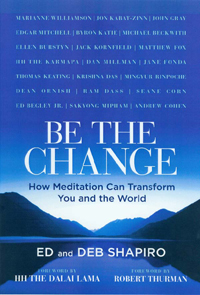
The good news is that we have just unexpectedly discovered how social networking can generate a new type of forgiveness!
We aren't super tech savvy, and when we were finally able to get on LinkedIn, Ed wasn't sure what to do next. Pressing what looked like an innocuous button, he thought he was inviting just some new business contacts and work friends, but what he actually did was inadvertently invite everyone we had ever sent an e-mail to, including Deb's 88-year-old mother.
We only knew this had happened when we started to receive hundreds of "accepts" from everyone and anyone, including three people Ed used to know but, due to difficult circumstances, he no longer had anything to do with. In Buddhist terms, these people are simply known as the enemy -- anyone you had a hard time with or who is having a difficult time with you.
Our friend Kiri roared with laughter when we told her. She said it also happened to her and happens more often than we may realize:
What many of us fail to realize is that with a simple click of the mouse, our worlds open up far and wide, and, along with long lost friends, people we have consciously chosen to close out of our lives come tumbling back in. Suddenly we are faced with having to reject them again, or to open up and accept their online offerings of friendship.
Kiri's husband Phill experienced just that:
When Phill joined Facebook, it was for business purposes -- a way to promote his new tattoo shop and share photos of his art. What he didn't expect was that he would start receiving friend requests from dozens of people from his distant past. "Sure," he thought, "why not say hello?" He thought this would be similar to running into someone from high school in the grocery store. But after accepting someone he hadn't spoken to in nearly two decades, he then received a message wanting to rehash a fight they had had when just kids. "Why did you punch me that day?" the new/old friend demanded to know. Phill was faced with a whole slew of emotions about the vulnerability this world of social networking elicited. He had a choice: to close off again or see this as an opportunity to move forward and release old pains associated with his past relationships.
In the same way, unintentionally, Ed had accidentally invited three "enemies" -- three people he would probably have never communicated with again -- to be on LinkedIn, and he felt very odd. But in retrospect, it was brilliant. Or perhaps, as the saying goes, coincidence is God's way of remaining anonymous! With their acceptance, anything that was unresolved was released within Ed. It turned out to be a simple, impersonal and neutral way to offer and receive an olive branch.
There's a huge feel-good factor when adverse feelings dissolve. Gone is that nagging and uncomfortable negativity hovering somewhere in the back of your monkey mind. Gone is that distasteful communication or misunderstanding. In their place is a sense of relief and even forgiveness. Your world can move forward again. In Ed's case, he doesn't feel any particular need to see or communicate further with any of the three people, but he has no concern if he does. This leaves him feeling a whole lot happier and freer.
Releasing past conflicts is, therefore, an unexpected fringe benefit to modern technology (we are sure it wasn't listed as one of the original purposes!). If you are at all shy, unwilling or otherwise unable to face someone you are having a problem with, then you can just e-mail them. And, hey, presto! No problem!
Have you ever accidentally done this? If so, what was the outcome? Do comment below. You can receive notice of our blogs every Tuesday by clicking" Become a Fan" at the top.
***
See our award-winning book, "Be the Change: How Meditation Can Transform You and the World," forewords by the Dalai Lama and Robert Thurman, with contributors Kiri Westby, Michael Beckwith, Marianne Williamson, Dan Millman, Jane Fonda, Ram Dass, Byron Katie and many others.
Our three meditation CDs -- "Metta: Loving-Kindness and Forgiveness," "Samadhi: Breath Awareness and Insight" and "Yoga Nidra: Inner Conscious Relaxation" -- are available at www.EdandDebShapiro.com.
